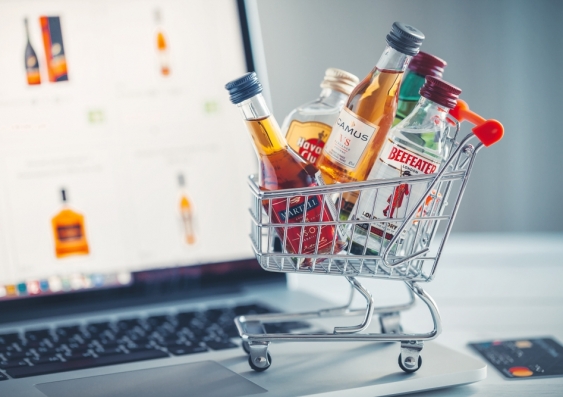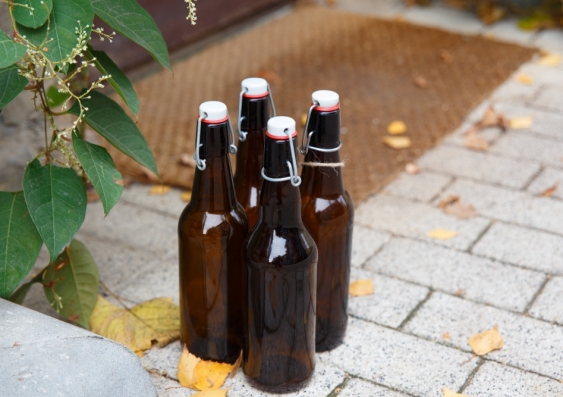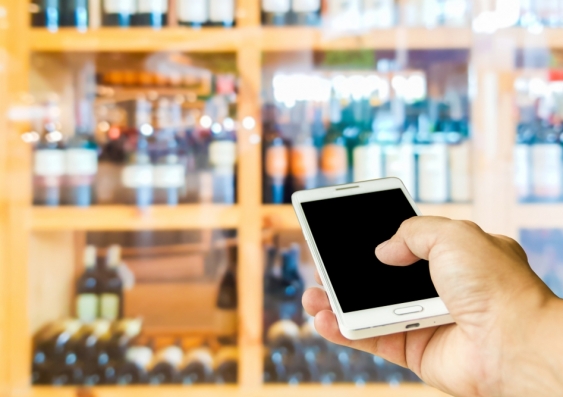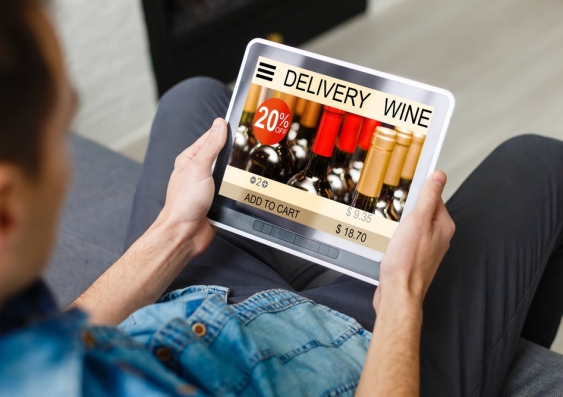Alcohol too easy for minors to buy online
Tougher laws for online alcohol sales are needed to prevent under-18s and people with an alcohol dependency from buying liquor at the touch of a button, UNSW public health researchers say.
Tougher laws for online alcohol sales are needed to prevent under-18s and people with an alcohol dependency from buying liquor at the touch of a button, UNSW public health researchers say.

Buying liquor online is just too easy, new UNSW Sydney research has found.
In an Australian first, public health researchers examined the sales, marketing and delivery practices of the 65 most popular online alcohol retailers in Australia, and the easy access to liquor – for anybody willing to buy it – shocked them.
Drug and Alcohol Review published the research, conducted in mid-2019, this month.
The researchers found 69 per cent of websites would leave alcohol unattended at an address without having verified the purchaser’s age; 12 per cent offered delivery within two hours; 13.8 per cent allowed customers to purchase alcohol through a “buy now, pay later” scheme; about 20 per cent offered a 750mL bottle of wine for under $5; 81.5 per cent offered discounts for buying more, and there was no requirement for delivery drivers to hold Responsible Service of Alcohol (RSA) certification.
Australian online alcohol sales were worth an estimated $569.4 million in 2019, representing 4.6 per cent of total alcohol sales, in a rapidly growing market where online sales averaged 14 per cent annual growth in the previous five years.
Soberingly, Australian Bureau of Statistics figures show there were 4,186 alcohol-related deaths in Australia in 2017, the latest data available.
Study co-author and UNSW Master of Public Health graduate Stephanie Colbert said that regulation had fallen behind the rapid growth in online alcohol sales in Australia.
“This is creating new problems around minors accessing alcohol, the sale of alcohol to intoxicated persons and easy access to cheap alcohol – from $2.88 for a 750mL bottle of wine, which is cheaper than a cup of coffee,” Ms Colbert said.
“The liquor industry recognises they can get away with more online: a recent industry report about online alcohol sales stated, ‘Unlike many liquor related industries, the Online Beer, Wine and Liquor Sales industry operates under a low level of regulation and policy.’
“I told a friend who brews beer for a living that delivery drivers don’t need an RSA to deliver alcohol to retail customers – he was shocked, and he works in the alcohol industry.”
Co-author Professor Robyn Richmond, of the UNSW School of Public Health and Community Medicine, said the community expected that online alcohol delivery services were subject to the same stringent standards as other modes of alcohol supply.
“Many people would be shocked to find out that this is simply not the case and that’s why, based on our findings, we call for online standards to be just as tough as when you walk into a pub or a bottle shop,” Prof Richmond said.
“The regulations are very, very lax online. The fact that online alcohol is accessible to minors, intoxicated persons can just get a top-up and it’s so easy to access cheap alcohol, at any time from any location, are all major concerns.
“Even their sales talk mentions customers going ‘thirsty’ if they don’t leave clear delivery instructions for the driver.”
Prof Richmond said it was all too easy for under-18s to use PayPal to buy alcohol online with few or no checks on their age: the study found 72.3 per cent of websites accepted PayPal.
“There’s a misconception that a teenager needs to steal their parent’s credit card to make the purchase, but they can just use PayPal,” she said.
“Even if you type in the birth year of a minor before making a purchase on these websites, you can just go back and enter an adult’s birth year. There’s no way for them to actually check.”

The lack of regulation with the delivery of alcohol bought online is a major concern for UNSW public health researchers who argue for the standards to mirror those in pubs and bottle shops. Photo: Shutterstock
Ms Colbert said she was surprised that nine of the 65 websites she examined, 13.8 per cent, enabled customers to buy alcohol through “buy now, pay later” schemes such as Afterpay or Zip Pay.
“These services are not regulated under the National Credit Code, so the usual consumer protections and responsible lending obligations do not apply,” she said.
“These services make it so easy to buy alcohol by reducing the upfront cost to a fraction of the total and combined with convenient home delivery of an addictive substance, this is alarming.
“We suggest that to reduce harmful drinking and financial stress among vulnerable customers, such as people with an alcohol dependency, ‘buy now, pay later’ services must be banned as a payment option for buying alcohol online.”
Ms Colbert said that cheap or free delivery also enhanced the appeal of buying alcohol online for people with limited upfront funds.
“Costs are similar to physical bottle shops and delivery doesn’t add much,” she said.
“More than half of the retailers in our sample offered free or discounted delivery if customers purchased over a specified threshold.”

There should be tougher regulations for buying alcohol online, UNSW public health researchers argue after their research showed how poorly regulated the growing market is. Photo: Shutterstock
Ms Colbert said she was also surprised with how most retailers, 75.4 per cent, advertised a willingness to leave alcohol unattended at an address.
“There are well-established links between the increased availability of alcohol and young people’s increased consumption of it,” she said.
“It was also a concern to find that 69 per cent of retailers advertised a willingness to leave alcohol unattended at an address without having ever verified the purchaser’s age, which could give minors access to alcohol.
“The point of delivery is the only chance for face-to-face age verification in an online sale; therefore, age verification at delivery should be mandatory for all online alcohol orders to meet the same minimum RSA standards as physical liquor stores and prevent sales to minors.”
Ms Colbert said Retail Drinks Australia’s self-regulatory code, introduced to address problems with online alcohol sales and home delivery, did little to allay her concerns about risks including minors having access to unattended alcohol.
“Retail Drinks Australia (RDA) claims they randomly audit signatories’ practices to gauge compliance, but how often they do this is unspecified – likely, it’s rare,” she said.
“Even if the RDA finds that a signatory company breached the code, the RDA just says they will contact the company and ask them to comply.
“The code stipulates signatories may be removed temporarily or permanently from the register only after repeated failure to comply. So, there are no real consequences.”
Ms Colbert supports the Foundation for Alcohol Research and Education’s position on the code.
The foundation states: “The code is a wholly inadequate response to the risks with online sales and home delivery of alcohol. The alcohol industry has a vested interest in selling alcohol to make a profit.
“The alcohol industry engages in the same tactics as the tobacco industry to prevent or delay government regulation and undermine good public policy.
“Self-regulation is an industry strategy to put in place minimal controls and prevent government regulation. It is not a legitimate route to harm minimisation.”

UNSW public health researchers are concerned that minors could access alcohol easily, after their research showed that most alcohol sales websites permitted unattended deliveries. Photo: Shutterstock
The study also found that an overwhelming majority of the online alcohol retailers, 89.2 per cent, offered visitors the chance to join their email list to receive discounts and promotions.
Ms Colbert registered her contact details with various websites for the purposes of the study and was surprised at how aggressive the retailers’ promotion and discounting strategies were to entice shoppers and retain their custom.
She said her limited experience with the websites was unlikely to reflect the full scale of promotion and discounting an average user would experience, but nonetheless such resource intensive sales tactics were a major concern.
“The websites often required my email address and phone number in order to review the online checkout and consider payment and delivery options,” Ms Colbert said.
“Once they had my details, I received innumerable targeted promotions and discounts via email and persistent, repeated phone calls – since I completed the study in June, I’ve received about a dozen calls from several companies – the most recent was a couple of days ago.
“For example, one retailer offered to help me complete my purchase and another called around Christmas time promising great Christmas deals.
“Even when I told them I was busy at work they promised to call me back after work. It’s very aggressive marketing. I’ve never bought anything from them!”
Ms Colbert said further research was needed to better understand how aggressive online marketing tactics influenced the purchase and consumption of alcohol.
“The fact these kinds of aggressive tactics are occurring is particularly concerning for vulnerable people in our community, such as those with an alcohol dependence,” she said.
Read the research paper in Drug and Alcohol Review: https://doi.org/10.1111/dar.13025